More than a month ago, the village Andriivka near the town Makarov (Bucha district of Kyiv region), was under Russian occupation. The shelter ‘Harbor’, located in this village, was founded by the NGO “House of Mercy” – a partner of the GELCU. The subsidiary of St. Martin’s congregation in Kyiv was also based on the shelter. Sergey Berezin served as a predicant (preacher) in the subsidiary. Together with the residents of the ‘Harbor’, Sergey survived the entire period of occupation and witnessed the crimes of Russian troops, including the destruction of the shelter house. A month after liberation, he agreed to give an interview and share what happened, what helped him to endure these trials and keep faith during such a difficult time, and how the experience affected his personality. The interview was taken by the coordinator of the GELCU media ministry, Deacon Alexander Zhakun.
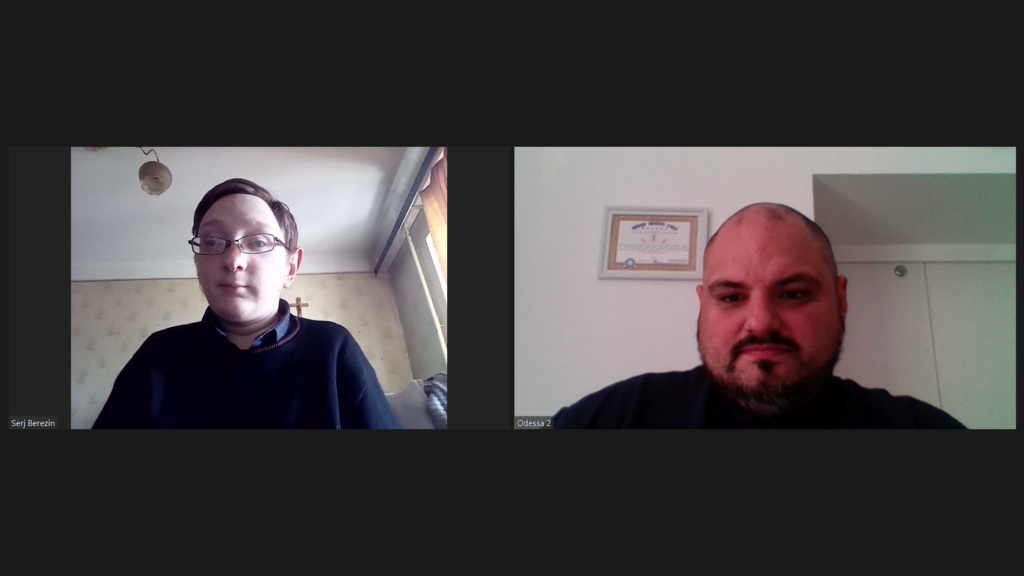
Please, tell us what exactly the ‘Harbor’ shelter was, what was its start in Andriivka and how did you start working there?
The NGO ‘House of Mercy’ operates in Kyiv, where it gives help to the homeless, particularly those with disabilities and in difficult life situations. The ‘House of Mercy’ rented flats for them in Kyiv, at the same time helping them to іntegrate in the society and renew their identification and documents. The organization always aspired to start a shelter in a village. In 2022 they bought a house in Andriivka and moved a few people to the new shelter. The ‘Harbor’ was founded so that such people could live there, integrate, socialize, do housework, work in the garden as much as they are able, and receive spiritual care.
The founder of the ‘House of Mercy’, Oleksiy Kuchapin, offered that I move there, take care of administrative matters, household, and take general oversight. The congregation of St. Martin opened its subsidiary in the shelter and blessed me to be a preacher and hold worship services, Bible lessons, and help the residents to give up their old ways of life and live according to Christian values.
How many members were there in the ‘Harbor’ when the war broke out?
Twelve people including me. Three of them were members of the congregation of St. Martin, other five were going through Catechesis, a course on the basics of the Christian faith.
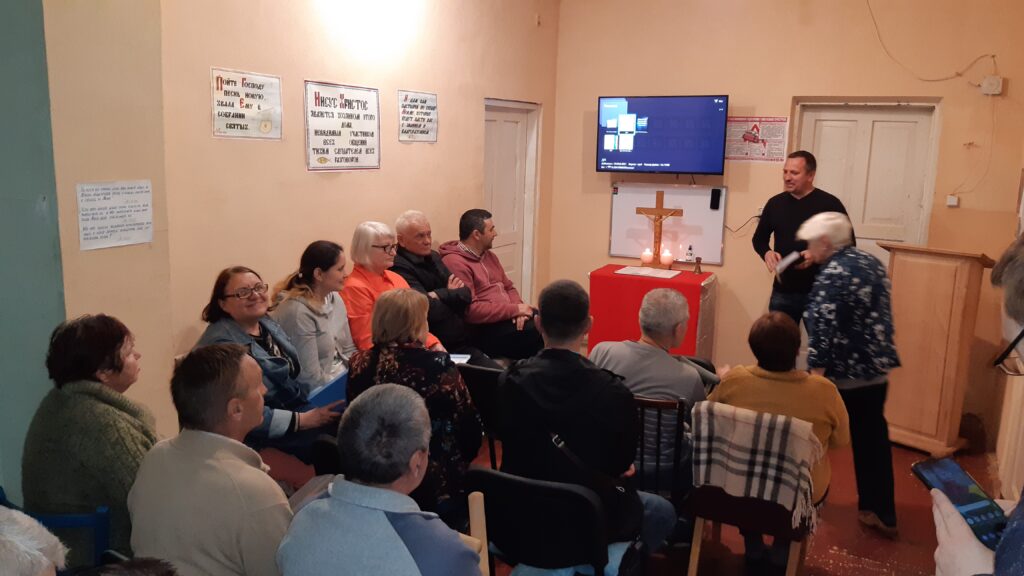
What did you feel when the occupation started? How did Russians behave at first?
In the beginning of the full-scale war, the employees of the ‘House of Mercy’ offered the residents a choice: they could leave or stay in Andriivka. Everyone decided to stay. When we heard the first shelling, and the Russian military entered the village, we thought that they would go further to Kyiv. Why would they need Andriivka? But Ukrainian army did not let them go any further, so they were forced to stop. That’s when we really felt threatened. People were upset to be in a situation, not being able to get out of the war-stricken village. But we didn’t panic.
When were connection and electricity cut off?
The Russian troops entered the village on March 27. It was Sunday, the time when we usually have our worship service. Russians started shelling, and we had to run to hide in the basement. And it was the next day, early in the morning, that we heard a strong explosion, after which electricity, and the Internet disappeared, and mobile communications began to break off. My mobile operator stopped working almost immediately. Others still could catch network, but the occupants reacted very aggressively to any attempts to get in touch with someone by mobile phone. We only managed to inform about the current situation, after which there was no communication until our liberation.
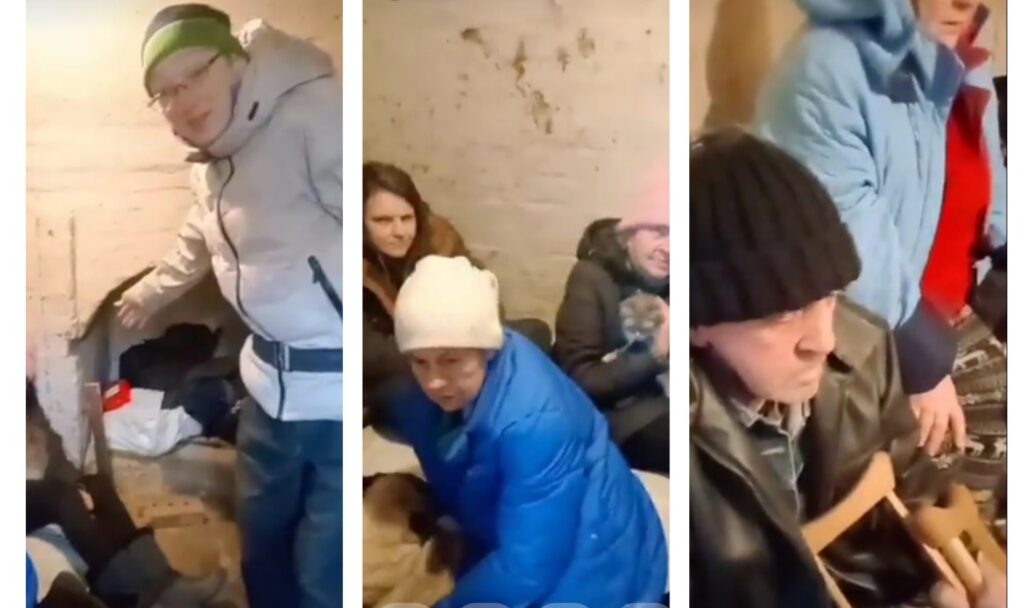
What was the situation with food, water, and medicines in the first days?
The shelter had a well, so we didn’t have a big problem with the water supply. However, when the electricity was cut off, many residents could not use it due to their physical condition: the electric pump did not work, and they did not have the strength to draw water by themselves. We had food supplies stored in the house, and in the basement several bags of potatoes for planting and homemade canned food. Shortly before the start of military actions, we bought medicines most needed in the time of peace, but the war showed that we did not have what is needed in wartime: bandages, dressings, etc.
How did the Russians treat you? Were there any attempts to rob the shelter?
Thank God, no. They came and saw that there are only the elderly and disabled in the house and left without taking anything. That moment we had a feeling of God’s special protection over us. But I have heard many testimonies from other villagers about plundering and other crimes committed by the occupants.
When and how was the house of ‘Harbor’ destroyed?
On March 10, a shell fell near the house, which caused the destruction: windows were broken in the women’s bedroom. And then it became clear that the ‘Harbor’ was in danger. The Russians fired from tanks right from people’s yards, hiding behind residential buildings, which were often hit in the process. A veranda was torn down in one of the neighboring houses, and in the other, the shed and the summer kitchen were destroyed.
But on March 12, one of the shells fired by the Russians hit the roof of the shelter and started a fire. I was not in the house at the time of the fire. I immediately ran to help evacuate the residents, but most of them had already gone down the basement themselves. I got to the fire extinguisher and tried to put out the fire, but it spread too quickly, and after three hours the shelter building burned to the ground.
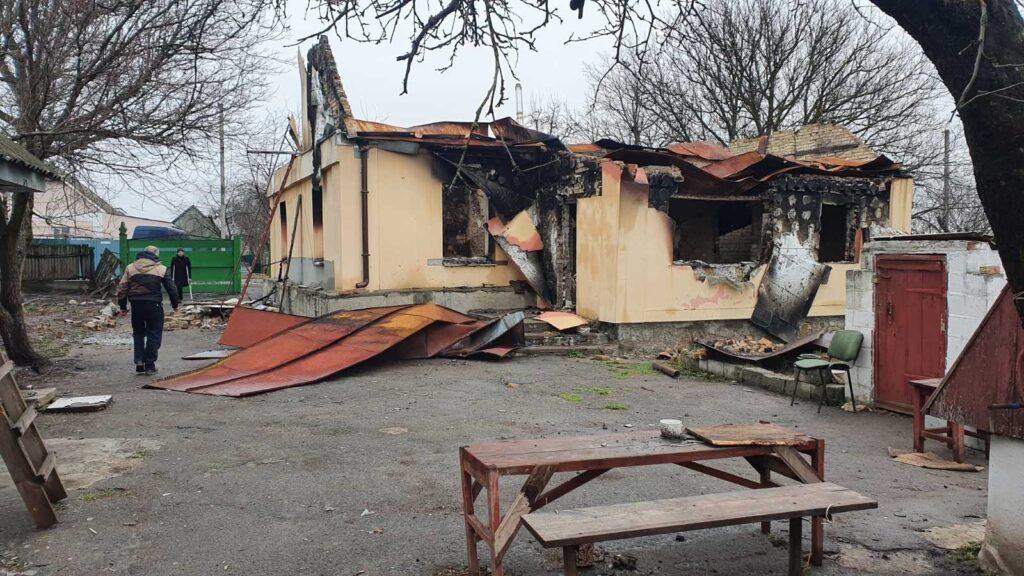
During the fire, a floor beam fell on one of the women, Lyudmila, and severely injured her back, causing a laceration, which had to be properly treated and stitched. But there were no doctors in the village, and since she couldn’t be provided with proper medical care and due to many other existing health issues, Lyudmila died two weeks later. She was buried in the village cemetery.
Personal belongings, telephones, and most supplies burned down in the fire – only what was in the cellar remained. A rehabilitation center of the Makarov Christian Church in Andreevka was extremely helpful – they sheltered us after the fire, so we were not left without a roof over our heads. They were also able to share some of their food supplies with us, so we weren’t starving. Also, neighbors down the street helped us a lot.
How were the Russians leaving the village?
After the Russians entered the village, we heard gunshots and machine guns every day, shells were constantly flying. But at some point, it became much quieter. We felt that something had changed. That day, one of the residents of the rehab center and I went to ask the Russians if we could hold Lyudmila’s funeral. We took a white flag and went to look for one of the commanders. But before that, we saw that a truck with gasoline was about to leave. It was clear that they were busy with something else, but in the end, we were allowed to hold the funeral.
And 5 days later after the funeral, the intensity of shelling decreased even more. A day later, on March 30, there was complete silence. Rumors spread that the Russians were leaving, and at least in Andriivka the fighting was over. After we held a meeting in the rehab center, we saw Russians arriving and entering one of the houses. They brought out a microwave, a TV-set and other things. It was shocking, but we thought that if they started robbing houses, it can mean that they are going to leave. And then our neighbors began telling us that there were no more Russians in Andriivka.
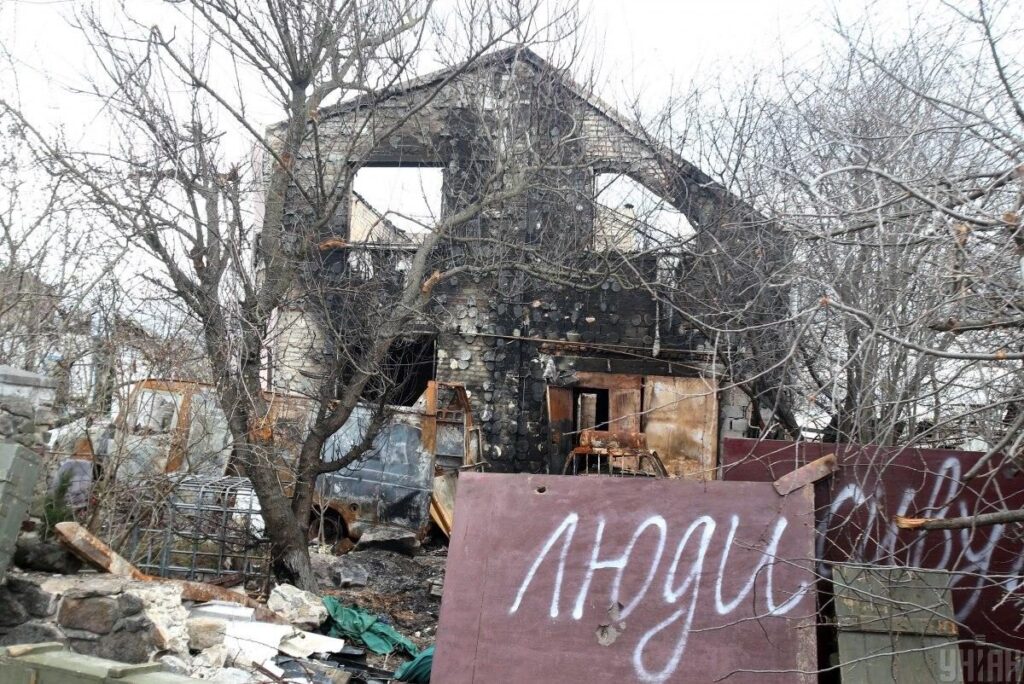
How did Ukrainian troops enter the village? What did you feel after meeting them?
On March 31, a member of our congregation, Yuri Kopytko and I decided to walk to Central Street. We reach it and saw a group of military men. We did not understand who they were. I thought they were Russians, and Yuri says that the uniform looks more like Ukrainian. We came closer, and it indeed turned out to be our military, the intelligence servicemen. They were unmining the perimeter because the Russians left behind explosives, mines, and tripwires. They were set on motorways, roads, roadsides… We said to the men: “Hello! We’re so glad you’re here! What is the situation like?” And they said, “It’s all right. We have driven them out of here, and these bandits won’t come back anymore, don’t you worry.” We asked them when and how we can leave the village. They told us, that only in 2-3 days, when at least half of the village will be cleared of mines.
Of course, we were happy to hear that, but it still wasn’t clear how long we would have to stay in the village before the opportunity to leave appeared. We had neither the contact with pastor Igor Shemigon, nor with the staff of the ‘House of Mercy’. My phone burned in the fire, as did those of others. In general, we were overjoyed, but there was also uncertainty. What should we do next? How do we get in touch with others?
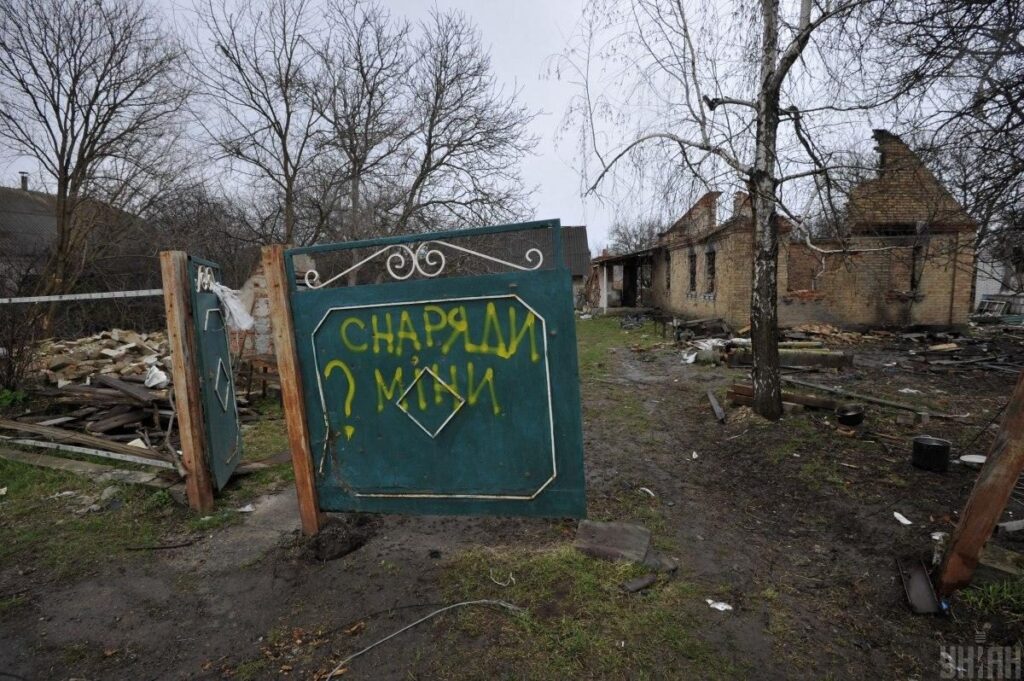
And then, sometime later, other military men arrived and began helping people. They even evacuated a woman with children. We were so happy when we realized that we had finally been liberated, and would even be taken away from here. The next day a social worker of the ‘House of Mercy’, Vladimir Skvorinsky, arrived and took us all to neighboring village Lipovka, which hadn’t been so damaged by the fighting. At first, all our men were taken to another rehab center, where we stayed for a while, and the women were taken to Ivano-Frankivsk immediately. After some time, Igor Shemigon arrived. He took with him the men who stayed there, and I went home to Kyiv.
What helped your residents and you personally to endure these difficult times?
I go through a Bible reading plan and tried to continue doing so during the occupation. It was time to read the book of Exodus. I looked at the book with completely different eyes and saw how God was helping us. He saw the troubles, saw the suffering of the Israeli people, and helped them. He brought them out of Egypt, gave them food and water, and took care of them all the time. God allowed them to be in bondage but freed them from it, and after that gave them strength and help. It was similar to my situation: I realized that it was God’s will for me to stay there. I realized that he would lead me out, he would set me free, he would help me, he would take care of me, and that nothing would hurt me. I strongly felt God’s support, but of course, didn’t put him to test by risking my life unnecessarily.
I held Sunday worship services for those who wished, preached, and tried to comfort them with the Word of God. For example, since the book with the Bible Watchword for 2022 burned down, on March 27 I chose the text from the Gospel of Mark 10:37-45, where the disciples of Jesus ask if they can sit on his right and left side, that is, to take the most privileged places at the royal court. Jesus asks them: “Can you drink the cup that I drink and be baptized with the baptism with which I am baptized?” But they said, “We can”. And then Christ says, “The cup that I drink, you will drink, and with the baptism with which I am baptized, you will be baptized.” And when I was preparing the sermon, I realized that God wants me to drink this cup he prepared for me as his disciple. Therefore, I need the humility to accept this situation and drink this cup to the last drop, no matter how bitter it tastes.
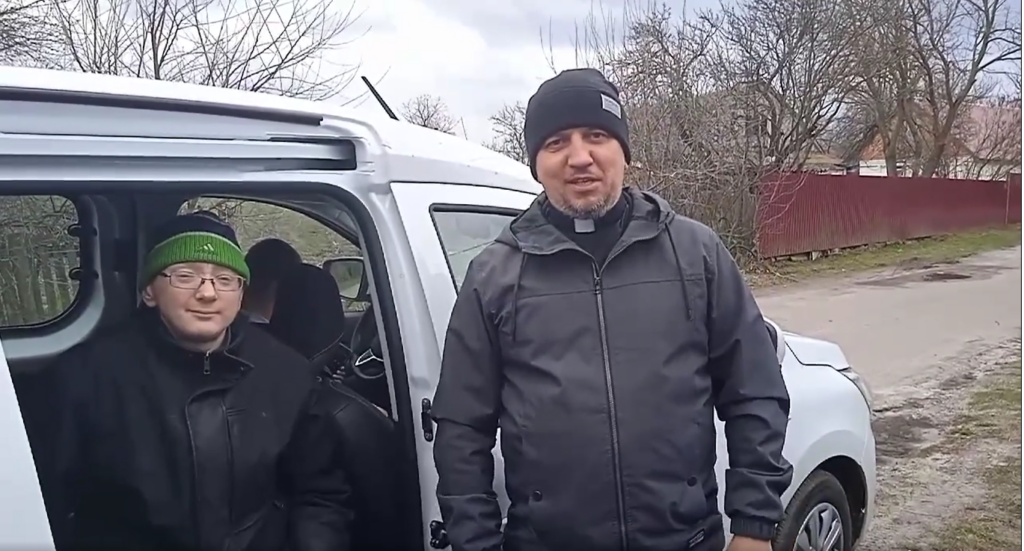
What changes did this experience bring about in your life?
Before this I didn’t fully understand the value of life. Life is life, I thought, nothing special about it. Of course, life is a gift from God. But usually, you don’t realize that you live. That you’re actually alive. After all that happened, you start to understand that life, and every day that the Lord God gives you is a great and precious gift that needs to be used for His glory.
This situation also taught me to appreciate everything I have, even to the smallest things. The leftover piece of bread, or potatoes, because there may soon be nothing to eat. Even this is a gift from God. You need to appreciate it and be always grateful to God, no matter what situation you find yourself in.
I constantly prayed to God, especially for other people: for my relatives, for myself, for the Church, and for those who are in a difficult situation. When I learned that Berdiansk was under occupation, I especially prayed for the parishioners of our Church in that city.
I also started looking at the Bible in a different way. It revealed itself to me, not only as a text that helps us in spiritual life but also as a text that encourages and gives us strength to do something and serve God. Now I see the Bible as the word of God, the witness of His will, which must be fulfilled. I began realizing that no matter what situation you find yourself in, there is always God’s will for it and God is strong to help you and deliver you out.
